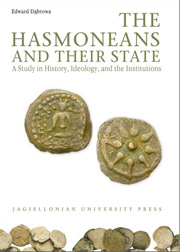Book contents
- Frontmatter
- Contents
- Introduction
- Abbreviations
- Part I Judea under the Hasmoneans (167–63 BCE)
- Part II The Institutions of the Hasmonean State
- I The Ruler
- 1 The Royal Priesthood or the Priestly Monarchy
- 2 The Priesthood
- 3 The Kingship
- 4 Succession
- 5 The Royal Family
- 6 The Court
- 7 The Capital City
- 8 The Palace and the Baris
- 9 Propaganda and Self-Presentation
- II The State
- Part III Society
- Conclusions
- Bibliography
- Index of Personal Names
- Index of Place Names
- Index of Ancient Sources
- Electrum - Volumes Published
- The Hasmonean State
3 - The Kingship
from I - The Ruler
Published online by Cambridge University Press: 05 September 2014
- Frontmatter
- Contents
- Introduction
- Abbreviations
- Part I Judea under the Hasmoneans (167–63 BCE)
- Part II The Institutions of the Hasmonean State
- I The Ruler
- 1 The Royal Priesthood or the Priestly Monarchy
- 2 The Priesthood
- 3 The Kingship
- 4 Succession
- 5 The Royal Family
- 6 The Court
- 7 The Capital City
- 8 The Palace and the Baris
- 9 Propaganda and Self-Presentation
- II The State
- Part III Society
- Conclusions
- Bibliography
- Index of Personal Names
- Index of Place Names
- Index of Ancient Sources
- Electrum - Volumes Published
- The Hasmonean State
Summary
As the rebellion against the Hellenistic religious reform was progressing, with Judah Maccabee and Jonathan scoring successes, the Hasmoneans won great prestige and strengthened their position. Their prerogatives included military command, political leadership, and the judiciary. Yet the actual positioning of each of Mattathias' sons was conditional primarily on their practical enforcement capacities, and not only within the circle of their followers but also within other groups of Judean society more or less willing to consent to Hasmonean supremacy. Immensely important, too, was the size of the area they were controlling and over which they exercised authority.
Considering in these terms the standing of the first Hasmoneans, we may be certain that their rule did not exceed merely local boundaries until Jonathan's reign. The process was helped not only by his victories, but also by a propitious turn of affairs caused by events taking place in the Seleucid state. These combined to make Jonathan no longer recognized as a hunted warlord, but rather as a tolerated local leader who, at the height of the struggle between pretenders to the Syrian throne, won the status of a valuable ally of one of them. This role brought him tangible benefits, augmented by political concessions accompanying each of the string of honors that came his way, the most precious of which proved to be his appointment to the high priesthood at the Jerusalem temple. In this way, Jonathan was elevated to being almost a sovereign leader of Judea.
- Type
- Chapter
- Information
- The Hasmoneans and their StateA Study in History, Ideology, and the Institutions, pp. 112 - 116Publisher: Jagiellonian University PressPrint publication year: 2009



